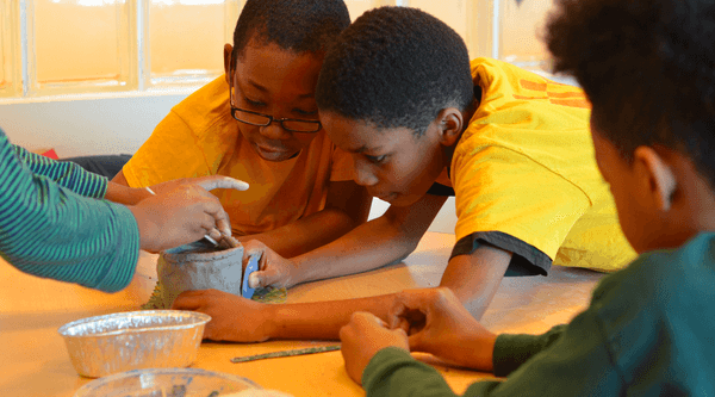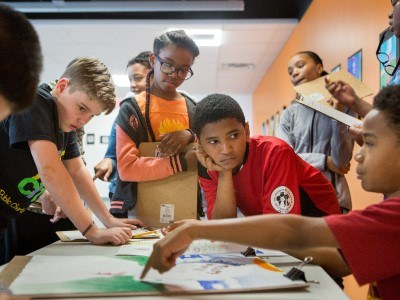Why Schools Need to Change
Think. Listen. Talk. Repeat.
Topics

Today’s learners face an uncertain present and a rapidly changing future that demand far different skills and knowledge than were needed in the 20th century. We also know so much more about enabling deep, powerful learning than we ever did before. Our collective future depends on how well young people prepare for the challenges and opportunities of 21st-century life.
The qualities of great learning experiences brim with freedom and joy, but students rarely experience those qualities in school.
In our work at Educating for Good with teachers and educators, we often begin conversations by asking them to consider a genuinely great learning experience they’ve had in their life, not necessarily connected to school (though it can be). The protocol we take them through is an adaptation of the Micro-lab protocol (originally from the School Reform Initiative, I think, but widely used). After some alterations, the fine teachers at Quabbin Regional High School in Barre, Massachusetts, renamed it Think. Listen. Talk. Repeat. (It was a contest. There was cheese danish.) It goes like this:
- Teachers break up into groups of three. (Three. No, not four. And not two!)
- Number each person in the group (person 1, person 2, person 3).
- There will be three rounds. You will be given a prompt for each round.
- Each round takes five minutes and will have the following structure:
- Reveal the prompt
- One minute for everyone to think or journal silently
- One minute for person 1 to respond
- One minute for person 2 to respond
- One minute for person 3 to respond
- Extra minute for padding
- The facilitator will keep the time
- In round one, person 1 responds first. In round two, person 2 responds first. In round three, person 3 responds first.
On the spectrum of tight to loose, it’s meant to be a tightly timed protocol. When a person is speaking, they are the only ones speaking. It’s not a conversation, but a sharing. The person gets the whole minute, meaning if they are done speaking after 20 seconds, the group stays silent until the minute is up. (Usually, at the 50 second mark, the speaker will say, “Oh, and there’s also …”) Whoever’s minute that is, they own the whole danged minute. The structure is designed to make sure everyone’s voice is heard in the room. It is there to prevent what I have called The Tyranny of the Gregarious.
The prompts we use are these:
- Describe a truly great learning experience you’ve had in your life, a time in which you mastered something and in which you felt great or fulfilled while doing it. It does NOT have to be related to work or school.
- At the beginning of the process, when you didn’t know the knowledge or skill, but you wanted to know it, how did it feel to be bad at that thing? Why did you persevere? What supported you in continuing your learning? What incentives were there?
- If you wanted someone to know that you were good at the thing you learned, how could you get them to know that? What different things could you do so that they would know you had mastered that thing?
All sorts of interesting things emerge from this protocol. For one thing, teachers, in general, are really uncomfortable with the idea of “mastering” something, even though that’s what we’re asking of kids every time we give a summative assessment. Because it’s uncomfortable, I leave the word in so that we can talk about it.
The range of things we hear about is truly awesome. Many—including me—talk about playing music or learning some art form. Folks talk about learning to drive and teaching someone else to drive. Stick shifts come up a lot. Mod Podge. Cooking. Couponing. Knitting. Figuring out a city mass transit system. Sewing. Kayaking. Math. Map making. Critical thinking. Parenting. Patience. And assessment. Working with hundreds of teachers over the years, we’ve heard every kind of thing.
What are the qualities of “great learning experiences” that people talk about?
Great learning experiences begin with a point of freedom. In every case—every case—the person telling the story of their learning began with some variation of, “I decided I wanted to learn …” Also, in describing great learning experiences, folks were, in fact, describing joyful learning experiences. These aren’t all necessarily happy learning experiences—I still remember a scuba diving story that was terrifying—but joy is not shallow in that way. It involves struggle and achievement and fulfillment. And it begins with freedom. Twenty-five years ago, I decided I wanted to learn to play the accordion (true story, not the setup of a joke), and I am still learning to play it, today. It has been hard and frustrating. Being bad at it was appalling but becoming better at it was amazing. I chose to learn to do that and there is no feeling better for me than “demonstrating learning” by playing for dancers and watching, in their faces, the joy.
Because all great learning begins with “I decided …” all great learning is just in time learning, never just in case. I didn’t learn the principles of accordion playing so that, in case I wanted to play one day, I would be able to.
It’s a powerful set of questions because—sorry to say—the qualities of the “great learning experiences” that people surface are generally absent from our school structures. Most often kids are not “deciding they want to learn” a thing or skill. Their feelings in the early stages of learning aren’t baked into the instructional process, and they aren’t given a choice about whether to stick with it. They aren’t given a choice about how they might demonstrate what they know. For the record, not a single adult said a multiple guess test would be a way to show someone that they “are good at the thing they learned.” Even those things that might involve a multiple guess test—e.g., driving—the test was only a preliminary step to the actual demonstration.
And here’s the part where you call me a wild-eyed idealist. Our schools should be brimming with both freedom and joy. In fact, when we think about something like Ethical Assessment (as I did last month) student freedom and joy are essential, fundamental principles. Not just because it’s “the right thing to do” but also because, without that level of engagement (which is what the freedom and joy represents), the student learning will be tortured and attenuated. The experience will drive kids away from whatever it is you want them to learn, and it will drive them away from learning in general. This is damaging—really damaging, not metaphorically damaging—to kids.
Freedom and joy is the right thing to do. Which means that doing otherwise would be the wrong thing to do. If you aren’t doing Ethical Assessment, what are you doing?
Photo at top courtesy of Two Rivers Public Charter School.




